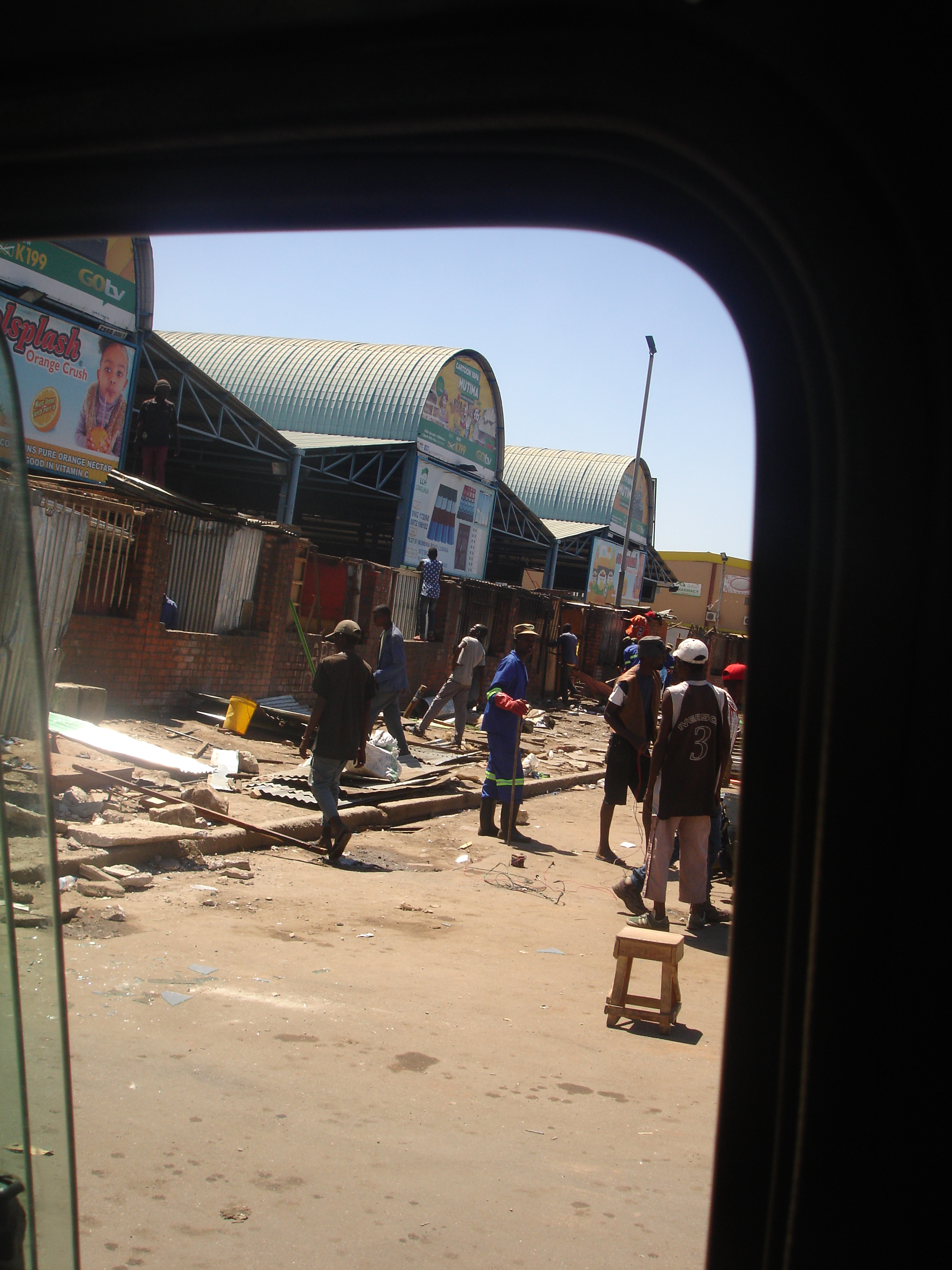Alexander Bwalya `Chikwanda walks tightrope … ….revokes Statutory Instrument 35 and 55
Notice: Undefined index: catFilterList in /home/zambi/public_html/wp-content/plugins/wp-likes/api.php on line 243
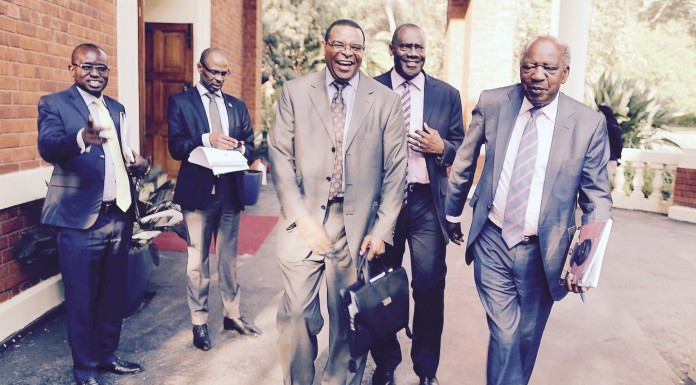
Bank of Zambia Governor, Dr. Denny Kalyalya and BoZ Deputy Governoer Operations, Bwalya Ng’andu with Alexander Bwalya Chikwanda and Amos Chanda`Chikwanda walks tightrope …
….revokes Statutory Instrument 35 and 55
By Derrick Sinjela and Favourite Kalando report for Rainbow Newspaper Limited New Chilenje, Lusaka
DARING critics, Zambia’s Finance Minister Alexander Bwalya Chikwanda maintains that the Patriotic Front government will not idealise development but will stride toward creating practical interventions that empower citizens.
Meanwhile, Chikwanda took a bold step as he announced the immediate revocation of Statutory Instrument No 35 of 2012 barring quoting of products and services in foreign currencies and Statutory No. 55 of 2013 which empowered the Bank of Zambia (BoZ) to intervene on the money market.
“Statutory Instrument No. 55 of 2013 and Statutory Instrument No. 35 of 2012 were passed principally to support the implementation of monitory policy. However, challenges have arisen in the implementation of these instruments, thus to facilitate consultation, Government has decided to revoke them. Government assures citizens that consultation with other veritable options are meant to protect and safeguard public interest,” stated Chikwanda.
In an apparent response to criticism that lack of a clear economic policy character was scaring investors and Foreign Direct In=vestment (FDI), Chikwanda aptly referred to by peers as ABC resolutely maintained that ideologies do not put food on the table or mouths of ordinary citizens.
Responding to questions raised during a ‘State of the Economy’ address at the Ministry of Finance (MoF) boardroom on Friday 21st March 2014, Chikwanda refused to dance to a tune branding the Patriotic Front (PF) Government as commandist and authoritarian.
“We shall not be limited by ideologies in our work as Government. I will not be drawn into debating whether or not the Patriotic Front Government under the leadership of President Michael Chilufya Sata is commandist or market driven. Our focus shall be placement of food in homes of the 13 million plus Zambians,” Chikwanda protested during a Press Conference attended by secretary to the treasury Fredson Yamba, Permanent Secretary-Economic Management and Finance- Felix Nkulukusa and MoF Public Relations Manager, Chileshe Kandenta.
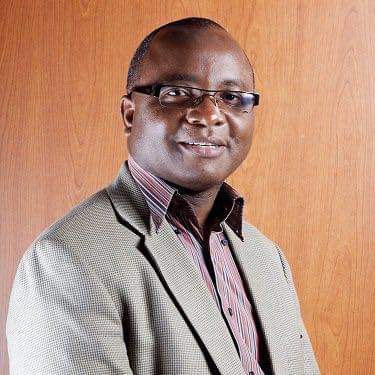
Secretary to the Treasury Felix Nkulukusa
Chikwanda insisted that in the quest to meaningfully empower the Zambian people, the Patriotic Front leadership would resist the temptation of being populist, pointing out that reality demanded that pragmatism is prioritized.
“In our quest to improve the wellbeing of the people, abolishing the noted high poverty levels is imperative and not ideological or theological arguments. Our goal as Government is to ensure that an inclusive and consultative benefit wisdom is granted priority,” said Chikwanda.
Meanwhile, Chikwanda equally parried a suggestion seeking Governments intervention in the property marker arguing that his economic management team will not seek participation in penalizing home owners through introduction taxation.
“Our view is that it is not tenable to tax home owners. It is our contention that rates charged as rentals will come down on their own through market influences. Zambians are doing well in the property market and I believe that once housing stocks are increased, invariably, rates charged by landlord will fall,” Chikwanda argued.
On the proposed re-introduction of the Industrial Development Corporation (IDC) Chikwanda explained that a selection process for board members was in progress.
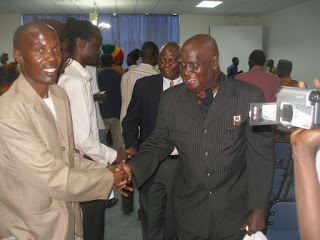
Derrick Sinjela with KK -Picture by Zindabah Mwanzah
Chikwanda reiterated that Government had been prompted to introduce the IDC, following failure by the private sector to lead industrialization of rural areas, in more than two decades (23 years).
Critics allege is a reincarnation of the United National Independence Party (UNIP) INDECO Limited established First Republican President Dr Kenneth David Buchizya Kaunda, who ruled Zambia from October 24th 1964 till October 31st 1991, when Second Republican President, the late Dr Frederick Jacob Titus Chiluba and the Movement for Multiparty Democracy (MMD) leadership took office.
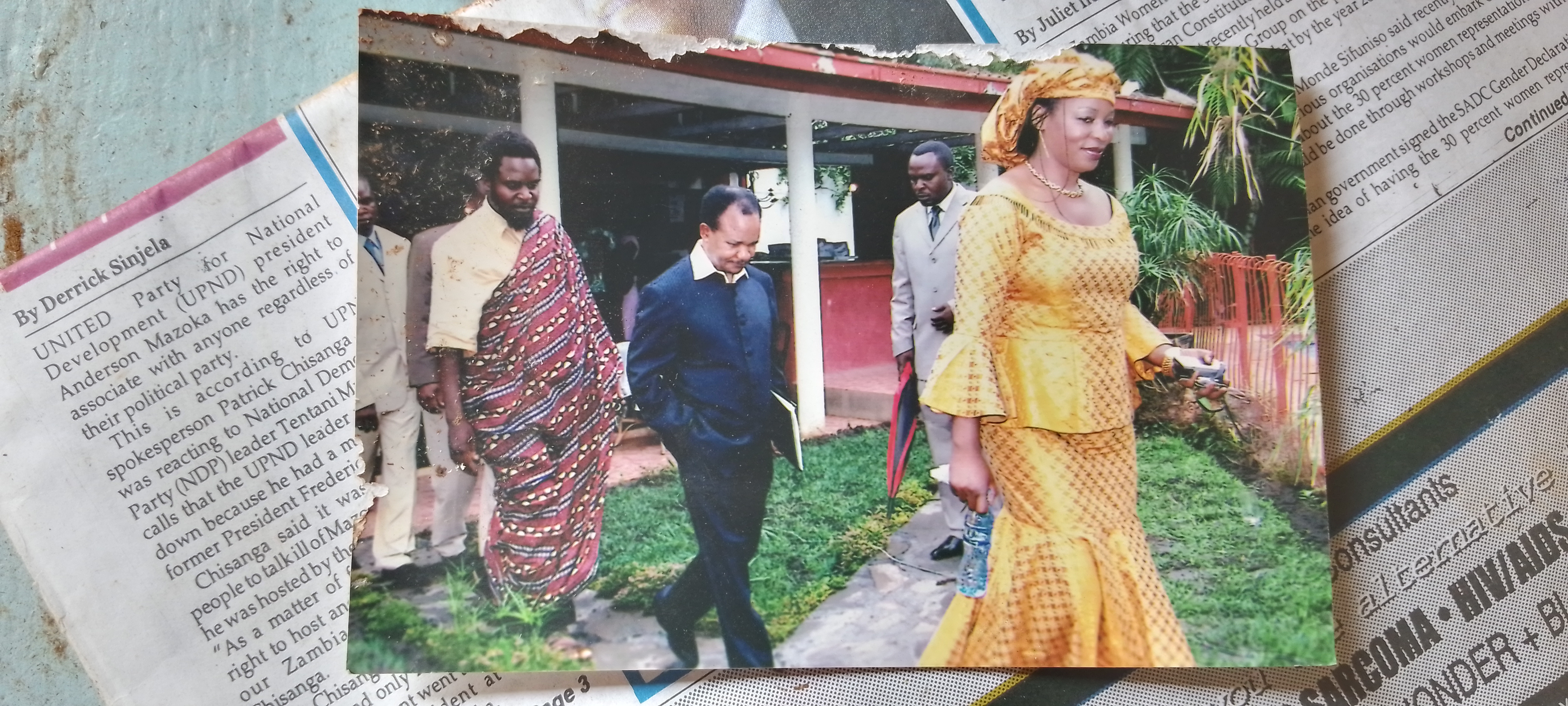
Dr. Saviour Chishimba, Dr. Frederick Chiluba and Ms. Regina Mwanza
However, though a market driven policy came into being, the private sector which assumed control of industry failed to resuscitate Zambia’s manufacturing and industrial sector, prompting Chikwanda and team to intervene by letting the Government lead.
Another concern raised by Chikwanda is the low level participation of the Zambian people in the local economy, a development that required reversal through enhanced performance of indigenously run Small-Scale Enterprises.
On the emotive issue of by-elections’ Chikwanda allayed fears of overspending pointing out that each timed a request is made by the Electoral Commission of Zambia (ECZ) such need is subjected to scrutiny by staff at the Ministry of Finance.
“Government always accommodates bye-elections but such requests by the ECZ are scrutinized,” Chikwanda stated.
And stressing that Government was is control of the economy, Chikwanda argued that the local-kwacha currency would only be sustainably strengthened through productivity.
Chikwanda stated that the 2013 economic performance was stronger attested by Gross Domestic Product (GDP) preliminary outturn pegged at 6.6 per cent, pointing out that since the PF assumed office in 2011, the economy had annually averaged 6.9 per cent growth.
“Economic diversification away from copper is slowly being attained as attested by the positive growth in Non-Traditional Exports averaged at 41.9 per cent. In 2013, the Non-Traditional Exports sector grew by 23 per cent and accounted for 32 per cent of Zambia’s total export earnings,”
Alluding to one of the world’s two reputable reviewers-Fitch Ratings, which affirmed Zambia’s strong growth prospects at B rating, Chikwanda bragged that the assessment was indicative of positive strides recorded by the Patriotic Front (PF) Government.
In a Friday 21st March 2014 report released in London, Fitch Rating affirmed Zambia’s long-term foreign and local currency Issuer Default Ratings (IDRs) at ‘B’
However, Fitch Rating report noted that vulnerabilities had increased as fiscal policy turned more expansionary and the exchange rate came under pressure due to weaker copper prices and policy pronouncement which undermined private sector confidence.
www.derricksinjela.blogspot.com
======
Zambia kicking malaria out Malaria
….walking –walking towards a malaria-free Zambia zone
By Derrick Sinjela and Favourite Kalando report for Rainbow Newspaper Limited New Chilenje, Lusaka
Zambia has been on a war path, seeking and introducing interventions targeted at keeping malaria at bay.
Successive Government’s including the current Patriotic Front (PF) leadership under Zambia’s 5th Republican President Michael Chilufya Sata and Health Minister Dr Joseph Kasonde remain resolved towards a malaria-free society.
In a Tuesday 2nd August 2011 Ministry of Health (MoH) report dubbed, Prevention and Control-The Zambian story released by then Directorate of Public Health&Research-Director Dr Victor Mukonka malaria endemic was estimated at 3.2 million cases 2009 (HMIS).
Clearly, Dr Mukonka had defined three (3) epidemiological zones-‘Integrated, Decentralized and strides made towards burden reduction.
Zones of transmission intensity Zambia-2010 were in three categories, very low-blue, low-green and moderately higher-red, though progress with interventions was noted.
Dr Mukonka pointed out that five-districts in 2003, scaled-up to eight in 2005, rising to 15 districts covered by 2007, reaching 36 in 2008 and covering 54 of the 73 districts by 2011.
There was also a noted progress with intervention in Insecticide Treated Nets (ITNs) distributed between 2008 and 2010.
In 2003, Zambia reviewed her treatment policy, 2004 saw the country being covered with ACTs-Artemether-Lumefantrine, a drug of choice for uncomplicated malaria, introduction of dispersible paediatrics formulation in 2009, strengthened diagnosis-RDTs 2005; continued microscopy scale up and increased access to diagnosis and treatment up to community.
On Intervention Coverage, Dr Mukonka noted that households reporting owning at least one ITN in 9 provinces of Zambia-2006-2010, and a proportion of children under 5-years-old reporting to be sleeping under an ITN.
Indoor Residual Spraying, a percentage of households had confirmed receiving the intervention, while Impact on Mobidity&Mortality due to scale up of interventions.
In addition, malaria interventions scale-up and mortality reductions measured percentage-DHS, MIS, Child mortality rates per District Health Survey (DHS) 2007.
Parasitemia rates by province-MIS in 2006,2008 and 2010 and Anaemia prevalence rates by province in 5-year-olds covering same period.
And quoting a World Health Organisation (WHO) and Zambia Health Demographic Survey (ZHDS) 2007, Dr Mukonka restated that Zambia remained committed to the fight against malaria evident by a stronger political leadership will, increased financial resources, strengthened a well coordinated partnership and enhanced community engagement.
www.derricksnjela.blogspot.com
Memories of Hatambu Hambulo
By Derrick Sinjela and Favourite Kalando report for Rainbow Newspaper Limited New Chilenje, Lusaka
FAMILY members led by Forum for Democracy and Development (FDD) President Edith Nawakwi spent a day at church remembering the life of Hatambu Hambulo, who was slain in unclear circumstances on 8th January 2013 in Lusaka’s Ibex residential area.
Speaking in a row, family members expressed regret at the untimely demise of Ms Hatambu Hambulo, who at the time of her demise worked as a Marketing Executive with Zambia’s food Reserve Agency (FRA) in Lusaka.
During a memorial held on Saturday 22 February 2014 at the Catholic run and controlled Mary Immaculate Parish, Leopards Hill Road, Woodlands, in Lusaka family members who included Home Affairs Minister Dr Ngosa Simbyakula chorused an immediate capture of murderers or those implicated with Ms Hambulo’s death.
On her part, Ms Nawakwi moaned the loss of Ms Hambulo whom she described as a reliable good-hearted step-daughter.
“She was always there for each and every one in the family, and our prayer remains that the culprits who made us lose her will be caught and adequately dealt with,” Ms Nawakwi, who previously served as Zambia’s Finance and Economic Planning Minister reminisced.
Ms Nawakwi lamented that Ms Hambulo had marked herself as a dependable daughter, sister, cousin, niece and friend since her birth on 1st May 1986 at the university Teaching Hospital (UTH) in Lusaka.
The service was attended by Mr Geoffrey Hambulo, Ms Rosemary Shamweemba, while Mweemba read First Reading from 1 Corinthians 15:50-58, Mukombe from Psalm 23:1-6 and Father Kenan Chibawe read the Gospel according to John 14:1-6, with family, friends and FRA colleagues sharing tributes.
The late Hatambu accomplished her formal education from 1991-2010 at Namununga Primary School, Roedean school (South Africa), Lusaka Learning Centre and finally University of Zambia (UNZA) Great East Road Campus, attaining a Bachelor of Science in Agriculture Degree.
Late Hatambu later joined the Ministry of Education as a Teacher and taught at Luanshya High School, after which she proceeded to work at Airtel before joining the Food Reserve Agency as a Marketing Officer in 2012.
And speaking later after, Hatambu’s tombstone was unveiled, at Leopards Memorial Park, Home Affairs Minister Dr Simbyakula indicated a resolve toward strengthening the performance of the Zambia Police Force (ZPF), which markets itself as a service.
Dr Simbyakula reiterated a resolve toward enhanced operational performance of the police officers under the leadership of Inspector General of Police (IG) Stella Libongani and her deputy Dr Solomon Jere.
“Our focus for now is to ensure that all effort is placed are increased performance of law enforcement agencies. It is our wish to improve operational capacity of the Zambia Police Service,” Dr Simbyakula observed.
Dr Simbyakula emphasized a need toward creating a safer and protective environment in which crime detection is enhanced through an empowered policing.
Family members described Hatambu as a vibrant young Christian woman, who participated in church activities.
Her cousin, Father Kenan Chibawe from Monze parish, described Ms Hambulo as warm personality who loved people regardless of social status and prayed that the law will eventually nab the culprits who mercilessly killed.
“I knew her as a good hearted person who loved people. I have lamented in my heart as to why the assailants did not let her live. The assailants could have just gone away with the car as it is difficult to replace a life once lost, but a car can easily be replaced with money,” Father Chibawe moaned.
FRA colleague, Ms Towela Jere equally described the late Ms Hatambu Hambulo as a candid employee.
Family Spokesperson, a retired Commissioner of Police Joachim Bbenkele expressed gratitude on behalf of the Hambulo clan pointing out that till killers are caught, it will be difficult to cope with Hatambu’s demise.
Later, a reception was hosted at Triple M Events Gardens, Twin Palm Road in Lusaka.
www.derricksinjela.blogspot.com
=======
Zambia’s Chankwakwa food chain
By Derrick Sinjela and Favourite Kalando report for Rainbow Newspaper Limited New Chilenje, Lusaka
ZAMBIAN firms are increasing participating in agricultural effort to improve income levels among ordinary citizens and the national goal of attaining nutritional compliance at household level.
One such firm is Chankwakwa, whose initiator Ms Dorothy Erikson has gone out of her way developing recipe’s packaged for sale beyond the Zambian market, with the United States of American (USA) market being a reliable platform.
According to Erikson, Chankwakwa is a story about perseverance and a struggle towards attaining local quality.
“Chankwakwa is a story about perseverance and a struggle for local quality. For us the flavor is the key to success and we are recognized locally for top quality food products. The flavor is first and foremost a result of the family’s tradition for good food and Dorothy Erikson’s own recipes. It is like experiencing Dorothy’s own kitchen. The result is unmistabable. A line of unique products on the international arena,” bragged Ms Erikson during an exhibition hosted by Gender and Child Development Minister Inonge Mutukwa Wina as female entrepreneurs prepared to travel to the USA on an African Growth Opportunity Assistance (AGOA) programme.
Chankwakwa, a firm brand specialised in production of packaged jams and marmalades, variety of sundried fruit, soya bean products and energy porridge, sundried tomatoes, chutney and pickle, honey, chilies and tomato sauces marks itself as a leader in nutritious foods through a community empowering initiative.
Chankwakwa community empowerment
According to Ms Erikson, families in Zambia have had no tradition of cultivating mangoes on a commercial level, to the extent that people have more often than not continued to throw out the fruit as it is difficult to find a ready market.
However, it is against this realization that Chankwakwa is training and organizing families in cooperatives, as an effective practical means of empowering families with a ready and sustainable market for mangoes..
“Chankwakwa empowers small scale farmers by giving them the necessary knowhow on the mango fruit and vegetable growing so as to be able to produce quality crops which we eventually process once purchased,” a positive Erikson bragged pointing out that to date more than 100 families have been enlisted.
“The family’s local support and involvement in the areas of health and education, and the environment which benefit 100 families directly and indirectly employed at Chankwakwa farm,” Erikson observed.
Chankwakwa farm located in Kabwe, Central Province was established in 1973, and following a failed attempt the enterprise was forced to diversify into other crops and a food processing plant three decades later in 2003.
Chankwakwa’s desire is to maximize on the use of Zambian grown produce through evidence based agricultural experimentation, with the company vision being production of high quality food products, empowering surrounding communities, becoming a leading producer of sundried fruit and exportation of canned products to the international market.
Chankwakwa was among the first local food business in Zambia that achieved HACCP certification accorded by the Switzerland based Swiss SGS (SANS 10330:2007).
Aside from the Swiss SGS certification, Chankwakwa has equally earned ECOCERT, a certification for compliance to international standards.
Although the local farming community has never used any insecticides on their mango trees, the ECOCERT certification protects them against insecticides in the future.
The FAIRTRADE structure consists of organizing farmers in a democratic cooperative and ensures a sustainable future for the targeted families.
The FAIRTRADE system sets high minimum prices on fruit and yields a shared profit for the local community.
========


